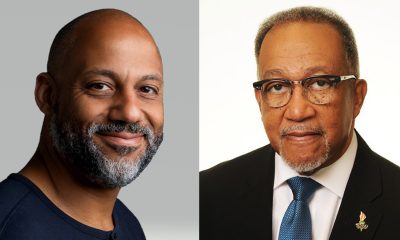Community
California Black Caucus Gives Thumbs Up to Law Reforming Courtroom Sentencing
The new law marks a correction to a ruling that was only meant to last two years but ended up lasting 14.

Members of the California Legislative Black Caucus (CLBC) are applauding a new law Gov. Newsom signed on October 8 that modifies the state court sentencing procedure for crimes.
Senate Bill (SB) 567 requires judges to only hand out sentences with lengths that match a number of years that reflect the median point of the possible term.
Moving forward, according to the new law, sentences will only exceed middle term after circumstances presented to a jury are proven beyond a reasonable doubt.
“We are now in a period of reckoning that requires us to confront the reality and interconnectedness of racism, inequality, and injustice which have permeated our institutions and deprive people of liberty, without the fundamental standards for fairness in our processes,” said Sen. Steven Bradford (D-Gardena), who is chair of the CLBC
The new law marks a correction to a ruling that was only meant to last two years but ended up lasting 14.
In 2007, the Supreme Court of the United States (SCOTUS) held in Cunningham v. California ruled that California’s determinate sentencing law was unconstitutional. The court found that California law impermissibly allowed judges to impose an upper/maximum term based upon facts that were never presented to a jury and deemed to be true beyond a reasonable doubt. This was a violation of the 6th Amendment to the U.S. Constitution right to a trial by jury, according to the SCOTUS.
Later that year, a temporary law was put into place allowing judges to impose any of the three sentencing terms as long as they stated a reason for giving them. The law allowed judges to apply a maximum sentence without granting defendants the opportunity to have a jury determine if the reasoning for the sentence was true or not. The law was supposed to last until 2009 when a review of the sentencing process could determine a long-term solution.
However, the mandate ended up lasting until Gov. Newsom signed the law a little over a week ago.
Bradford was a lead proponent of SB 567 as part of this year’s criminal justice reform efforts.
“SB 567 makes our criminal justice system more credible and is a step in the right direction for criminal justice reform. I am grateful to Governor Gavin Newsom for signing the bill and appreciate the support of my legislative colleagues who voted for the bill because, only together, can we create a system that gives the public more confidence,” he said.
The bill was also sponsored by California Attorneys for Criminal Justice, Legal Services for Prisoners with Children, and Communities United for Restorative Youth Justice and supported by organizations such as Ella Baker Center for Human Rights, Los Angeles County District Attorney’s Office, and San Francisco Public Defender.
“SB 567 is a huge step forward in the fight for true justice in the courtroom. The impact of long sentences on individuals and families should not be taken lightly or subjected to arbitrary terms. As a lawyer and someone who has been impacted by the loss of loved ones to incarceration, I find this bill a worthy step in the right direction,” said Joanna Billingy, policy manager for Legal Services for Prisoners with Children.
SB 567 will take effect on Jan. 1, 2022.
Activism
Oakland Post: Week of April 24 – 30, 2024
The printed Weekly Edition of the Oakland Post: Week of April 24 – 30, 2024

To enlarge your view of this issue, use the slider, magnifying glass icon or full page icon in the lower right corner of the browser window. ![]()
Alameda County
DA Pamela Price Stands by Mom Who Lost Son to Gun Violence in Oakland
Last week, The Post published a photo showing Alameda County District Attorney Pamela Price with Carol Jones, whose son, Patrick DeMarco Scott, was gunned down by an unknown assailant in 2018.

Publisher’s note: Last week, The Post published a photo showing Alameda County District Attorney Pamela Price with Carol Jones, whose son, Patrick DeMarco Scott, was gunned down by an unknown assailant in 2018. The photo was too small for readers to see where the women were and what they were doing. Here we show Price and Jones as they complete a walk in memory of Scott. For more information and to contribute, please contact Carol Jones at 510-978-5517 at morefoundation.help@gmail.com. Courtesy photo.
City Government
Vallejo Welcomes Interim City Manager Beverli Marshall
At Tuesday night’s Council meeting, the Vallejo City Council appointed Beverli Marshall as the interim city manager. Her tenure in the City Manager’s Office began today, Wednesday, April 10. Mayor Robert McConnell praised Marshall’s extensive background, noting her “wide breadth of experience in many areas that will assist the City and its citizens in understanding the complexity of the many issues that must be solved” in Vallejo.

Special to The Post
At Tuesday night’s Council meeting, the Vallejo City Council appointed Beverli Marshall as the interim city manager. Her tenure in the City Manager’s Office began today, Wednesday, April 10.
Mayor Robert McConnell praised Marshall’s extensive background, noting her “wide breadth of experience in many areas that will assist the City and its citizens in understanding the complexity of the many issues that must be solved” in Vallejo.
Current City Manager Michael Malone, whose official departure is slated for April 18, expressed his well wishes. “I wish the City of Vallejo and Interim City Manager Marshall all the best in moving forward on the progress we’ve made to improve service to residents.” Malone expressed his hope that the staff and Council will work closely with ICM Marshall to “ensure success and prosperity for the City.”
According to the Vallejo Sun, Malone stepped into the role of interim city manager in 2021 and became permanent in 2022. Previously, Malone served as the city’s water director and decided to retire from city service e at the end of his contract which is April 18.
“I hope the excellent work of City staff will continue for years to come in Vallejo,” he said. “However, recent developments have led me to this decision to announce my retirement.”
When Malone was appointed, Vallejo was awash in scandals involving the housing division and the police department. A third of the city’s jobs went unfilled during most of his tenure, making for a rocky road for getting things done, the Vallejo Sun reported.
At last night’s council meeting, McConnell explained the selection process, highlighting the council’s confidence in achieving positive outcomes through a collaborative effort, and said this afternoon, “The Council is confident that by working closely together, positive results will be obtained.”
While the search for a permanent city manager is ongoing, an announcement is expected in the coming months.
On behalf of the City Council, Mayor McConnell extended gratitude to the staff, citizen groups, and recruitment firm.
“The Council wishes to thank the staff, the citizens’ group, and the recruitment firm for their diligent work and careful consideration for the selection of what is possibly the most important decision a Council can make on behalf of the betterment of our City,” McConnell said.
The Vallejo Sun contributed to this report.
-

 Activism4 weeks ago
Activism4 weeks agoOakland Post: Week of March 27 – April 2, 2024
-

 #NNPA BlackPress4 weeks ago
#NNPA BlackPress4 weeks agoCOMMENTARY: D.C. Crime Bill Fails to Address Root Causes of Violence and Incarceration
-

 #NNPA BlackPress4 weeks ago
#NNPA BlackPress4 weeks agoMayor, City Council President React to May 31 Closing of Birmingham-Southern College
-

 #NNPA BlackPress4 weeks ago
#NNPA BlackPress4 weeks agoBeloved Actor and Activist Louis Cameron Gossett Jr. Dies at 87
-

 Community1 week ago
Community1 week agoFinancial Assistance Bill for Descendants of Enslaved Persons to Help Them Purchase, Own, or Maintain a Home
-

 Activism3 weeks ago
Activism3 weeks agoOakland Post: Week of April 3 – 6, 2024
-

 Business1 week ago
Business1 week agoV.P. Kamala Harris: Americans With Criminal Records Will Soon Be Eligible for SBA Loans
-

 Activism2 weeks ago
Activism2 weeks agoOakland Post: Week of April 10 – 16, 2024





















































